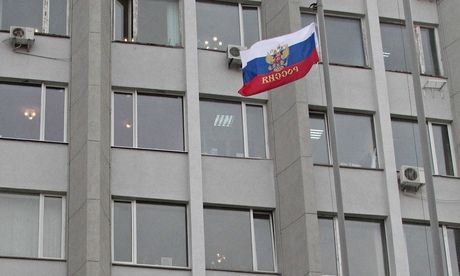 A Russian flag outside city hall in Sevastopol. Photograph: ReutersRussian flag raised at city hall in Sevastopol, home of Russia's Black Sea fleet, where Viktor Yanukovych may have taken refuge, theguardian.com reports.
A Russian flag outside city hall in Sevastopol. Photograph: ReutersRussian flag raised at city hall in Sevastopol, home of Russia's Black Sea fleet, where Viktor Yanukovych may have taken refuge, theguardian.com reports.
Speculation is rife that Crimea – with its large ethnic Russian population and fervent pro-Moscow mood – could become the target of Kremlin ambitions, and a possible secessionist plot that would rip Ukraine apart.
All eyes are on Sevastopol, the historic home of Russia's Black Sea fleet. Russian media said Viktor Yanukovych – last spotted in the resort of Balaclava – may have taken refuge on a Russian military boat in the port.
Angry crowds, meanwhile, gathered in Sevastopol. They reject the authority of Kiev's new opposition-led government and want to install as mayor Alexei Chalov, a businessman and Russian citizen who favours union with Moscow. On Monday a Russian flag was even hoisted above Sevastopol's city hall.
These febrile scenes raise the spectre that Crimea might declare autonomy from Kiev and seek to join the Russian Federation, possibly after a Kremlin-encouraged referendum. This scenario is, as yet, unlikely. But with Moscow's intentions unclear and a power vacuum in Kiev, Sevastopol is key to Ukraine's future as a unitary sovereign state.
More than half of Crimea's 2 million inhabitants are ethnically Russian. The Russian fleet in Sevastopol employs more than 25,000 and enjoys overwhelming local support. Unlike in much of the rest of Ukraine, where statues of Lenin have been felled in a revolutionary frenzy, Sevastopol's giant Lenin still gazes serenely over the Black Sea, next to white-painted Russian classical naval buildings. The town's hilly streets are adorned with Soviet memorials.
The last time Sevastopol experienced insurrectionary sentiment was in 2008 when Viktor Yushchenko, Ukraine's then pro-western president, announced plans to evict the Russian fleet. Excitable pro-Russian Crimean politicians said any move to oust the fleet would result in conflict. After Yushchenko lost power, his successor, Yanukovych, extended the fleet's lease for 25 years. In return the Kremlin gave Ukraine a discounted gas bill.
Far-right Ukrainian nationalists, meanwhile, accuse Moscow of planning to prise Crimea away. They suggest the Kremlin might use the same tactics it deployed in South Ossetia and Abkhazia, the breakaway republics of Georgia. In the runup to the 2008 war between Georgia and Russia, Moscow distributed Russian passports to residents living in the two secessionist enclaves. That August the pro-western Georgian president Mikhail Saakashvili made an ill-advised attempt to retake South Ossetia by force. Russia responded with a full-scale invasion – saying it had to defend its new citizens from attack.
Yushchenko's officials frequently accused Russia of trying to "passportise" Crimea in the same way. In reality, there was not much evidence of this, though the Kremlin has actively sponsored pro-Russian organisations on the peninsula.
In Moscow on Monday, the Duma discussed new legislation which would make it easier for ethnic Russians and their family members living in Ukraine to get Russian passports. Ominously, Russia's foreign ministry said the human rights of ethnic Russians in Ukraine were being "infringed".
Vladimir Putin's intentions towards Ukraine remain unclear. Russia has reaffirmed Ukraine's modern borders several times. But Putin is known to be contemptuous of the notion of Ukrainian statehood; according to a leaked US diplomatic cable citing Poland's foreign minister Radoslaw Sikorski, he regards it as a "cobbled together country" with six million Russians in it.
Ukraine is central to Putin's belief that Russia has "privileged interests" in the former Soviet republics. It is a fair bet that he would seek to undermine or sabotage any new Ukrainian government that moved further away from Russia's orbit.
More than any other territory outside Russia's borders, Crimea occupies a romantic place in the Russian imagination. It is synonymous with military glory – imperial and Soviet. Catherine the Great built a naval citadel there after defeating the Turks in 1783. A Russian fleet has been there ever since.
History also explains Crimea's modern ethnic divisions. In 1944 Stalin deported Crimea's Tartars – the peninsula's original Turkic-speaking Muslim inhabitants – to central Asia. He replaced them with Slavs from Russia or Russian-influenced parts of eastern Ukraine.
Most of the newcomers were from poor urban backgrounds; they moved into homes vacated by deportees. They had weak ties with Ukraine.
After the Soviet collapse, and even before, Crimean Tartars returned home. Well-educated and politically organised, they now number 300,000 – 15% of Crimea's population. They reject the notion of union with Russia and are loyal to Kiev – another volatile element in an already combustible ethnic mix. Pro-Kremlin politicians argue that Crimea only ended up in an independent Ukraine by historical accident, when Nikita Khrushchev transferred Crimea to the Ukrainian Soviet Socialist Republic in 1954.
They freely admit they would like Crimea to join the Russian Federation. "It's a myth that Ukraine is not part of Russia. We don't believe it," Oleg Rodilov, a pro-Russian MP in Crimea's autonomous parliament said in 2008. It would be wrong to accuse him of "separatism", he added. "For you, Ukraine and Russia are a priori different states. For us they area priori the same," he said.
The links of culture, language and Orthodox religion made Ukraine and Russia an indivisible entity, he said. Also, both countries were Slavic, he said. "We don't believe there is any difference. We have been together for 350 years."
 В Атырау
+21
В Атырау
+21  Send your news to AqZhaiyq
Send your news to AqZhaiyq